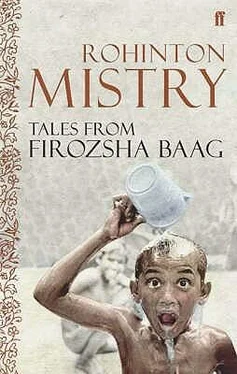Rohinton Mistry - Tales From Firozsha Baag
Здесь есть возможность читать онлайн «Rohinton Mistry - Tales From Firozsha Baag» весь текст электронной книги совершенно бесплатно (целиком полную версию без сокращений). В некоторых случаях можно слушать аудио, скачать через торрент в формате fb2 и присутствует краткое содержание. Год выпуска: 2006, Издательство: Faber & Faber, Жанр: Современная проза, на английском языке. Описание произведения, (предисловие) а так же отзывы посетителей доступны на портале библиотеки ЛибКат.
- Название:Tales From Firozsha Baag
- Автор:
- Издательство:Faber & Faber
- Жанр:
- Год:2006
- ISBN:нет данных
- Рейтинг книги:3 / 5. Голосов: 1
-
Избранное:Добавить в избранное
- Отзывы:
-
Ваша оценка:
- 60
- 1
- 2
- 3
- 4
- 5
Tales From Firozsha Baag: краткое содержание, описание и аннотация
Предлагаем к чтению аннотацию, описание, краткое содержание или предисловие (зависит от того, что написал сам автор книги «Tales From Firozsha Baag»). Если вы не нашли необходимую информацию о книге — напишите в комментариях, мы постараемся отыскать её.
Tales From Firozsha Baag — читать онлайн бесплатно полную книгу (весь текст) целиком
Ниже представлен текст книги, разбитый по страницам. Система сохранения места последней прочитанной страницы, позволяет с удобством читать онлайн бесплатно книгу «Tales From Firozsha Baag», без необходимости каждый раз заново искать на чём Вы остановились. Поставьте закладку, и сможете в любой момент перейти на страницу, на которой закончили чтение.
Интервал:
Закладка:
“Forgive me for ringing your bell so early in the morning but I wanted to let you know, if you need chairs or glasses, just ask me.”
“Thanks, but no one will —”
“No no, you see, yesterday was dusmoo , I am counting carefully. How quickly ten days have gone by! People will start visiting from today, believe me. Poor Minocher, so popular, he had so many friends, they will all visit —”
“Yes, they will, and I must get ready,” said Daulat, interrupting what threatened to turn into an early morning prologue to a condolence visit. She found it hard to judge her too harshly, Najamai had had her share of sorrow and rough times. Her Soli had passed away the very year after the daughters, Vera and Dolly, had gone abroad for higher studies. The sudden burden of loneliness must have been horrible to bear. For a while, her large new refrigerator had helped to keep up a flow of neighbourly companionship, drawn forth by the offer of ice and other favours. But after the Francis incident, that, too, ceased. Tehmina refused to have anything to do with the fridge or with Najamai (her conscience heavy and her cataracts still unripe), and Silloo Boyce downstairs had also drastically reduced its use (though her conscience was clear, her sons Kersi and Percy had saved the day).
So Najamai, quite alone and spending her time wherever she was tolerated, now spied Minocher’s pugree. “Oh, that’s so nice, so shiny and black! And in such good condition!” she rhapsodized.
It truly was an elegant piece of headgear, and many years ago Minocher had purchased a glass display case for it. Daulat had brought it out into the living-room this morning.
Najamai continued: “You know, pugrees are so hard to find these days, this one would bring a lot of money. But you must never sell it. Never. It is your Minocher’s, so always keep it.” With these exhortatory words she prepared to leave. Her eyes wandered around the flat for a last minute scrutiny, the sort that evoked mild dislike for her in Daulat.
“You must be very busy today, so I’ll —” Najamai turned towards Minocher’s bedroom and halted in mid-sentence, in consternation: “O baap ré! The lamp is still burning! Beside Minocher’s bed — that’s wrong, very wrong!”
“Oh, I forgot all about it,” lied Daulat, feigning dismay. “I was so busy. Thanks for reminding, I’ll put it out.”
But she had no such intention. When Minocher had breathed his last, the dustoorji from A Block had been summoned and had given her careful instructions on what was expected of her. The first and most important thing, the dustoorji had said, was to light a small oil lamp at the head of Minocher’s bed; this lamp, he said, must burn for four days and nights while prayers were performed at the Towers Of Silence. But the little oil lamp became a source of comfort in a house grown quiet and empty for the lack of one silent feeble man, one shadow. Daulat kept the lamp lit past the prescribed four days, replenishing it constantly with coconut oil.
“Didn’t dustoorji tell you?” asked Najamai. “For the first four days the soul comes to visit here. The lamp is there to welcome the soul. But after four days prayers are all complete, you know, and the soul must now quickly-quickly go to the Next World. With the lamp still burning the soul will be attracted to two different places: here, and the Next World. So you must put it out, you are confusing the soul,” Najamai earnestly concluded.
Nothing can confuse my Minocher, thought Daulat, he will go where he has to go. Aloud she said, “Yes, I’ll put it out right away.”
“Good, good,” said Najamai, “and oh, I almost forgot to tell you, I have lots of cold-drink bottles in the fridge, Limca and Goldspot, nice and chilled, if you need them. Few years back, when visitors were coming after Dr. Mody’s dusmoo , I had no fridge, and poor Mrs. Mody had to keep running to Irani restaurant. But you are lucky, just come to me.”
What does she think, I’m giving a party the day after dusmoo? thought Daulat. In the bedroom she poured more oil in the glass, determined to keep the lamp lit as long as she felt the need. Only, the bedroom door must remain closed, so the tug-of-war between two worlds, with Minocher’s soul in the middle, would not provide sport for visitors.
She sat in the armchair next to what had been Minocher’s bed and watched the steady, unflickering flame of the oil lamp. Like Minocher, she thought, reliable and always there; how lucky I was to have such a husband. No bad habits, did not drink, did not go to the racecourse, did not give me any trouble. Ah, but he made up for it when he fell sick. How much worry he caused me then, while he still had the strength to argue and fight back. Would not eat his food, would not take his medicine, would not let me help with anything.
In the lamp glass coconut oil, because it was of the unrefined type, rested golden-hued on water, a natant disc. With a pure sootless flame the wick floated, a little raft upon the gold. And Daulat, looking for answers to difficult questions, stared at the flame. Slowly, across the months, borne upon the flame-raft came the incident of the Ostermilk tin. It came without the anger and frustration she had known then, it came in a new light. And she could not help smiling as she remembered.
It had been the day of the monthly inspection for bedbugs. Due to the critical nature of this task, Daulat tackled it with a zeal unreserved for anything else. She worked side by side with the servant. Minocher had been made comfortable in the chair, and the mattress was turned over. The servant removed the slats, one by one, while Daulat, armed with a torch, examined every crack and corner, every potential redoubt. Then she was ready to spray the mixture of Flit and Tik-20, and pulled at the handle of the pump.
But before plunging in the piston she glimpsed, between the bedpost and the wall, a large tin of Ostermilk on the floor. The servant dived under to retrieve it. The tin was shut tight, she had to pry the lid open with a spoon. And as it came off, there rose a stench powerful enough to rip to shreds the hardy nostrils of a latrine-basket collector. She quickly replaced the lid, fanning the air vigorously with her hand. Minocher seemed to be dozing off, olfactory nerves unaffected. Was he trying to subdue a smile? Daulat could not be sure. But the tin without its lid was placed outside the back door, in hopes that the smell would clear in a while.
The bedbug inspection was resumed and the Flitting finished without further interruption. Minocher’s bed was soon ready, and he fell asleep in it.
The smell of the Ostermilk tin had now lost its former potency. Daulat squinted at the contents: a greyish mass of liquids and solids, no recognizable shapes or forms amongst them. With a stick she explored the gloppy, sloppy mess. Gradually, familiar objects began to emerge, greatly transmogrified but retaining enough of their original states to agitate her. She was now able to discern a square of fried egg, exhume a piece of toast, fish out an orange pip. So! This is what he did with his food! How could he get better if he did not eat. Indignation drove her back to his bedroom. She refused to be responsible for him if he was going to behave in this way. Sickness or no sickness, I will have to tell him straight.
But Minocher was fast asleep, snoring gently. Like a child, she thought, and her anger had melted away. She did not have the heart to waken him; he had spent all night tossing and turning. Let him sleep. But from now on I will have to watch him carefully at mealtimes.
Beside the oil lamp Daulat returned to the present. Talking to visitors about such things would not be difficult. But they would be made uncomfortable, not knowing whether to laugh or keep the condolence-visit-grimness upon their faces. The Ostermilk tin would have to remain their secret, hers and Minocher’s. As would the oxtail soup, whose turn it now was to sail silently out of the past, on the golden disc, on the flame-raft of Minocher’s lamp.
Читать дальшеИнтервал:
Закладка:
Похожие книги на «Tales From Firozsha Baag»
Представляем Вашему вниманию похожие книги на «Tales From Firozsha Baag» списком для выбора. Мы отобрали схожую по названию и смыслу литературу в надежде предоставить читателям больше вариантов отыскать новые, интересные, ещё непрочитанные произведения.
Обсуждение, отзывы о книге «Tales From Firozsha Baag» и просто собственные мнения читателей. Оставьте ваши комментарии, напишите, что Вы думаете о произведении, его смысле или главных героях. Укажите что конкретно понравилось, а что нет, и почему Вы так считаете.












